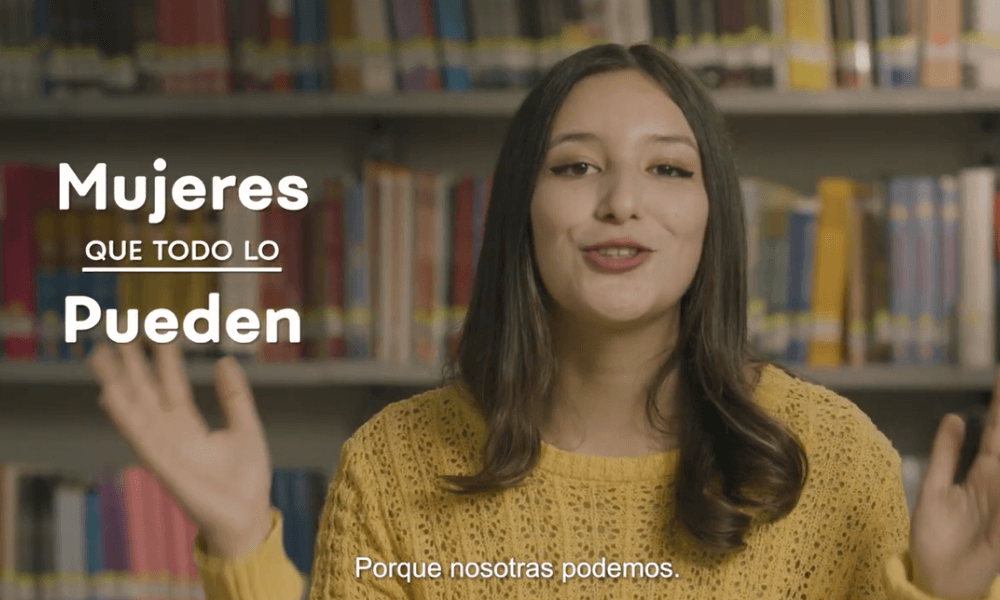“I always had engineering in mind, but I felt limited because I didn’t have a strong foundation in math,” says Ornella Ferrufino, a young woman from the O’Higgins Region who is now studying Mining Technology at the AIEP campus in Rancagua and dreams of leading teams on-site. Her story inspired the social experiment in the “Women Who Can Do It All” campaign, led by Fundación Luksic in collaboration with over 20 organizations, aiming to encourage more women in Chile to pursue STEM careers.
Ornella’s entry into the world of STEM wasn’t easy. Just like the viral “Dynamite Girl” video—featuring a young girl telling her parents that she wants to “blow everything up” when she grows up—the reactions to her decision were mixed. “At first, my parents didn’t support me. They were very afraid of me entering a male-dominated field. That made me question everything, but I decided to move forward and prove I could do it—and that it was what I truly wanted,” recalls the student, who says she chose the career based on its financial prospects, despite lacking support.
Through hard work, Ornella not only excelled in her studies but also became one of the recipients of the Luksic More Women in STEM Scholarship by Fundación Luksic, which grants $150,000 CLP per month for the official duration of the program. “Thanks to the scholarship, I was able to pay for transportation, materials, buy a computer, and even start saving,” she says. For her, this support has been decisive not only academically but also for her life project.
Now, as she nears the completion of her higher technical degree, she plans to continue on to engineering while working to gain experience. “Now my parents are proud because they see how passionate I am about this. I want to be an example for other girls who dream of studying in fields where we are still underrepresented.”
Empowering Agents of Change: Women Who Can Do It All
According to the Ministry of Education (2025), only 35% of women pursue STEM university degrees, and that number drops to 11% in technical-vocational education. Between 2024 and 2025, the Luksic More Women in STEM Scholarship has supported 200 women enrolled in higher technical programs across all regions of Chile. “Promoting the education of women in these fields is key for the country’s development. These careers offer better job opportunities, higher salaries, and drive innovation and growth. With this scholarship, we hope to open doors to new leaders and contribute to the major challenge of reducing the gender gap in this area,” says Fernanda Orellana, Director of Education at Fundación Luksic.
This year, the scholarship received more than 2,300 applications. Out of the total, 100 women between the ages of 18 and 49 were selected, with 71% coming from regions outside the Metropolitan Region—most notably from Valparaíso, Biobío, and O’Higgins, which had the highest number of recipients. Among the programs pursued by the selected candidates, the most prominent are Programmer Analyst Technician, Industrial Maintenance Technician, and Mining and Metallurgy Technician. There are also students enrolled in less conventional or “unusual” STEM fields, such as Geology and Drilling Control Technician, Renewable Energy Technician, and Heavy Machinery and Vehicle Technician.
Testimonies like Ornella’s, those of the scholarship recipients, and of prominent STEM professionals such as Barbarita Lara, Tere Paneque, and María Teresa, among others, are part of the Women Who Can Do It All community. This initiative aims to highlight stories that serve as sources of inspiration and raise awareness about the importance of education in these areas.
On the website www.mujeresquetodolopueden.cl, more than 60 outstanding women are featured. “Each of them represents a real opportunity to break stereotypes, open pathways in traditionally male-dominated industries, and become an inspiration for other girls and young women. We celebrate not only their talent and hard work, but also their commitment to building a more equitable future—one where innovation, science, and technology are driven by diverse perspectives,” concludes Fernanda.

